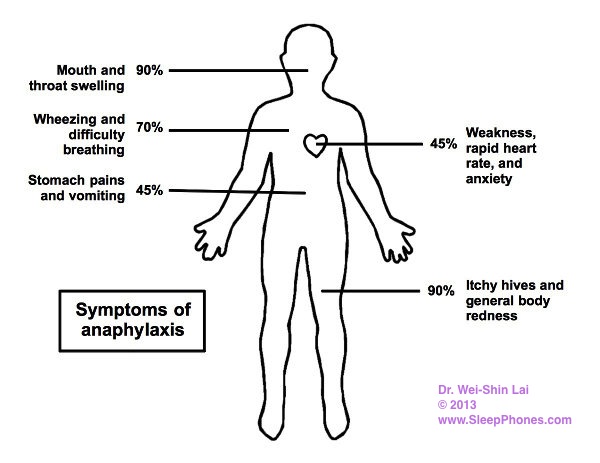A Look at Food Allergies: This Could Save Your Life (Part 1/4)
The tragic death of 13-year-old Natalie Giorgi who died on July 27, 2013 from eating a Rice Krispie treat which contained peanut products has many people asking questions about food allergies. Many of my friends are parents and have questions about food allergies in their own child or their children's friends. I hope this primer will prove useful.
There is a wide variation in the causes and the symptoms. Most food allergies are mild, but there are a few that can be deadly. With Natalie, she had an anaphylactic reaction (anaphylaxis) to the peanuts. Anaphylaxis is the most dangerous manifestation of an allergy. About 1% of people who have anaphylaxis die from it. Here's a link to Natalie Giorgi Sunshine Foundation holding a 2-mile FARE Walk on September 15th in Sacramento, CA.
What's anaphylaxis? It's a very severe allergic reaction. The person is exposed to a protein that they are extremely allergic to. The protein may be from peanuts, bee stings, or penicillin, for example. The person has antibodies that latch on to those proteins then trigger a chain reaction. The reaction results in leaky blood vessels, and clear fluid (serum) starts to accumulate in critical places. Most of the time, symptoms start in 5-30 minutes.

-
Throat:
Lips, tongue and throat swell from the leaking fluid, and severe throat swelling can block off the airway completely, which means you literally can't breath.
-
Skin:
Hives are possible, and you may notice swelling of the eyelids and other areas with thin skin because of the fluid build up.
-
Lungs:
The extra fluid accumulates in the air sacks in the lungs, causing wheezing, coughing, and feeling like you can't breath.
-
Digestive Tract:
Because of fluid build up along the digestive tract causing esophagus and stomach swelling, you would have stomach pains and vomiting.
-
General:
With all of the fluid leaking out from the blood vessels, the circulatory system has less and less fluid to work with. You feel weaker, light-headed, and the heart beats faster, causing anxiety and a feeling of doom.
Not all of the symptoms have to occur. The most common would be the skin and throat symptoms at 90%. Lung symptoms occur in 70% of cases, and 45% of cases have the digestive symptoms. Life-threatening fluid leakage from the blood vessels that is bad enough to drop your blood pressure, causing the general symptoms happen in 45% of patients. The drop in blood pressure from the anaphylaxis is also called anaphylactic shock. Shock means that the circulatory system is collapsing, and that's how Natalie died.
Anaphylaxis is the worst thing that can happen with a food allergy. Most people don't have such severe reactions, and most of the time, some Benedryl (a strong antihistamine), EpiPen (easy-dosing epinephrine — so easy you can even stick the needle through clothing), and prednisone (steroids to reduce immune system reactivity) can help to stop the symptoms. The patient should always go to the emergency room via ambulance, even if the symptoms start to go away with a dose of an EpiPen. The reaction may continue for hours, and the EpiPen only lasts for minutes. I recommend being carefully observed (always with someone) with another EpiPen and Benedryl for another 1-2 days after an anaphylaxis episode to make sure there's no delayed reaction, which there occasionally can be.
In my experience and in listening to those of fellow doctors, here's what I consider the worst offenders: bee stings, peanuts, tree nuts, CT scan dye, latex, and penicillin (and related antibiotics). There doesn't seem to be a lot of middle ground with those allergens. Repeated exposures over time become much more severe very quickly. For example, you may get a bee sting that swells an entire finger the first time. The next time, it makes your entire hand swell up. That's when you should see the doctor. The next time, you may have a mild anaphylaxis episode with wheezing and an entire swollen arm. That should prompt a trip to the ER. While you may get away with one mild anaphylaxis episode, future episodes are almost always much worse and potentially deadly. Although I just wrote "mild anaphylaxis," all anaphylaxis should be cause for alarm and be taken very seriously.
